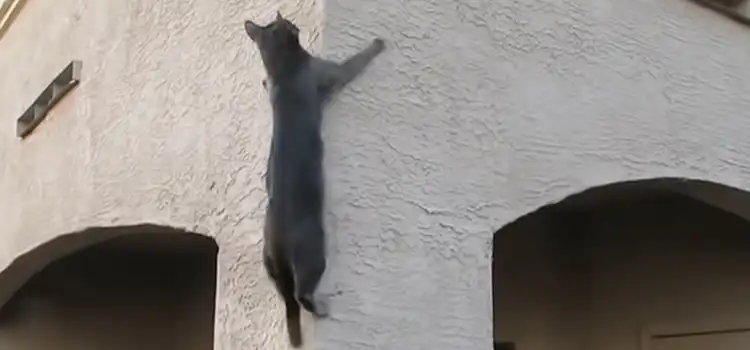Cats racing through the house and unexpectedly smacking into walls can be both hilarious and concerning for pet parents. If your furry friend is suddenly crashing into walls like a feline ping pong ball, you likely are wondering – why has my cat started slamming into walls? Is this normal behavior or a cause for concern?
Cat wall running usually results from play zoomies, territorial marking, or stress, which are normal kitty behaviors. However, increased frequency or head shaking after hitting walls can indicate vision or neurological issues requiring veterinary attention.
If you’ve ever wondered why your cat seems to have occasional rendezvous with your walls, you’re about to embark on a journey of discovery. We’ll unravel the mysteries of cat behavior, exploring different scenarios that might lead to this entertaining yet enigmatic phenomenon. Read on to learn more about the intricacies of this behavior.

Cat’s Wall Bumping Behavior
Feline wall crashing arises from a few common motivations:
- Zoomies and Play
Energetic cats, especially young kittens, often race around at top speed when experiencing “zoomies.” Losing control and hitting walls simply signals exuberant playtime and natural kitten clumsiness.
- Territorial Marking
Cats have scent glands on their heads, so bumping or rubbing against walls deposits facial pheromones to mark territory and contribute to a sense of security. It’s like kitty leaving a note saying “Mittens was here!”
- Stress and Anxiety
Nervous cats may run into walls more frequently. New environments, loud noises, changes in routine, or incompatible pets can all trigger anxious wall-bumping.
- Vision or Balance Issues
Rarely, cats with neurological conditions, vision problems, or vestibular disease will lack spatial awareness and frequently hit walls and furniture.
Normal Wall Crashes vs Problems
As long as your cat seems satisfied and unfazed after ping ponging off the walls occasionally, it is completely normal feline behavior. However, if wall running increases dramatically or is accompanied by other concerning symptoms, veterinary guidance is key.
Preventing Harm from Wall Crashes
To help minimize harm when your cat zoomies into walls, try these tactics:
- Provide ample scratching posts and cat trees to satisfy territorial marking instincts
- Reduce ambient stress by keeping litter clean, ensuring ample food/water, and maintaining consistent routines
- Create regular interactive play sessions to burn off excess kitten energy
- Consider synthetic pheromone diffusers to relieve anxiety and spraying behaviors
- Discourage access to dangerous areas like stairs until zoomie phases pass
With some simple adjustments, you can support healthy, happy wall running!
Seeking Veterinary Care
In most cases, wall running is nothing to fret about. However, consider having your cat evaluated if you notice:
- Agitation or head-shaking after hitting walls
- Increased frequency or new onset in adulthood
- Spaciness, staring at walls, or other signs of disorientation
- Other behavioral changes like litter box avoidance
Your vet can check for retinal issues, neurological disease, medication side effects, ear infections, and other underlying causes to explain any observed differences.
Conclusion
The sight of your cat running into walls may seem comical, but it’s usually a result of their playful nature, occasional misjudgments, or changes in their vision as they age. By understanding the factors at play and providing a safe and familiar environment, you can ensure a happier and healthier life for your feline friend. If you have more questions or stories about your cat’s wall encounters, please feel free to leave a comment below. Thank you for reading, and here’s to many more playful moments with your curious cat!
Frequently Asked Questions
What Health Problems Cause Cats To Run Into Walls?
Various neurological conditions, ear infections, medication side effects, vestibular disease, stroke, glaucoma, and retinal disease can cause spatial disorientation and lack of awareness that leads cats to frequently bump into walls. See your vet promptly if this behavior emerges.
Why Does My Cat Shake His Head After Hitting The Wall?
Head shaking after hitting a wall likely indicates dizziness, confusion, or pain associated with some underlying health issue. Make an appointment with your veterinarian right away to identify any vision, neurological, or inner ear problems.
How Do I Stop My Cat From Bumping Into Walls?
Try directing your energetic cat’s instincts toward positive outlets like playtime and scratching posts. Maintain calm routines, eliminate stressors, provide pheromone diffusers, and consult your vet if concerning symptoms arise with increased wall running incidents. With patience, the behavior often diminishes.
